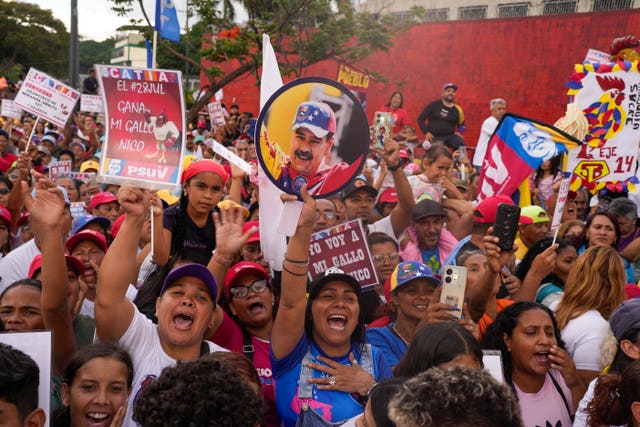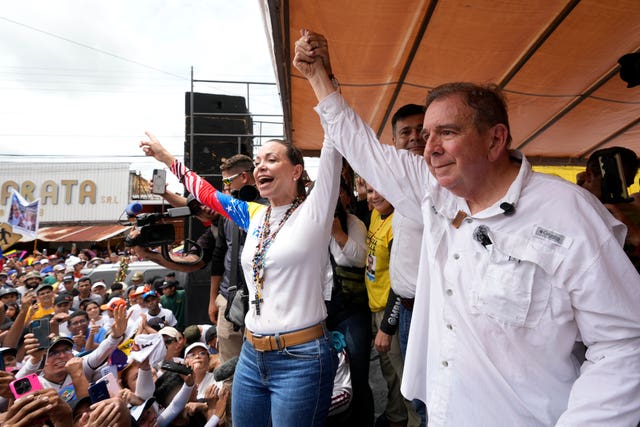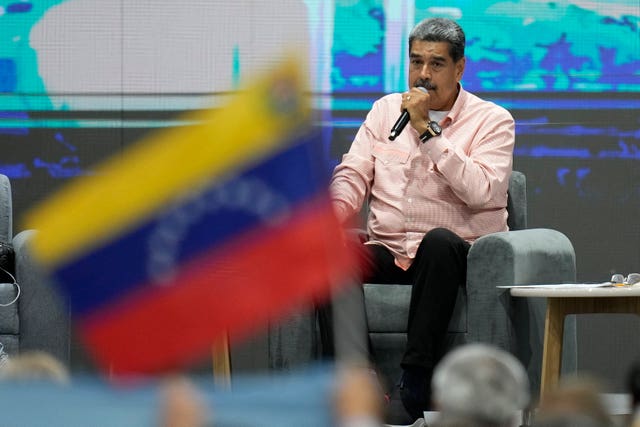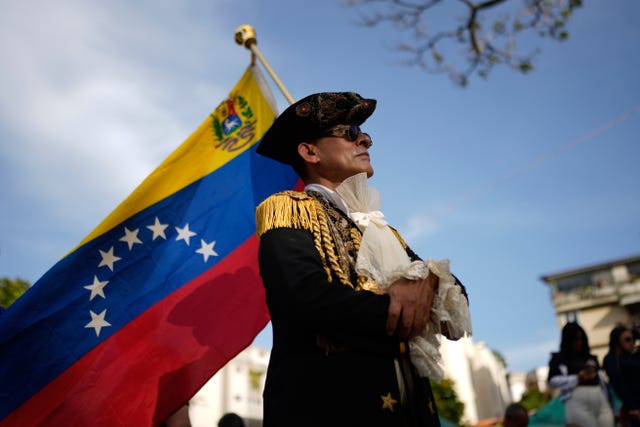Venezuela election could see seismic shift or give Nicolas Maduro six more years
An opinion poll in April said about a quarter of Venezuelans were thinking of joining the 7.7 million who have already gone abroad if Mr Maduro wins.

The people of Venezuela are voting in a presidential election the outcome of which will either lead to a seismic shift in politics or extend by another six years the policies that caused the world’s worst peacetime economic collapse.
Whether it is President Nicolas Maduro who is chosen, or his main opponent, retired diplomat Edmundo Gonzalez, the election will have ripple effects throughout the Americas.
Government opponents and supporters alike have signalled their interest in joining the exodus of 7.7 million Venezuelans who have already left their homes for opportunities abroad should Mr Maduro win another term.
Polls opened at 6am local time and the number of eligible voters is estimated to be around 17 million.

Authorities set Sunday’s election to coincide with what would have been the 70th birthday of former President Hugo Chavez, the revered leftist firebrand who died of cancer in 2013, leaving his Bolivarian revolution in the hands of Mr Maduro.
But Mr Maduro and his United Socialist Party of Venezuela are more unpopular than ever among many voters who blame his policies for crushing wages, spurring hunger, crippling the oil industry and separating families due to migration.
The 61-year-old is facing off against an opposition that has managed to line up behind a single candidate after years of intraparty divisions and election boycotts that torpedoed their ambitions to topple the ruling party.
Mr Gonzalez, 74, is representing a coalition of opposition parties after being selected in April as a last-minute stand-in for opposition powerhouse Maria Corina Machado, who was blocked by the Maduro-controlled Supreme Tribunal of Justice from running for any office for 15 years.
Ms Machado, a former politician, swept the opposition’s October primary with more than 90% of the vote. After she was blocked from joining the presidential race, she chose a college professor as her substitute on the ballot, but the National Electoral Council also barred her from registering. That is when Mr Gonzalez, a political newcomer, was chosen.

Sunday’s ballot also features eight other candidates challenging Mr Maduro, but only Mr Gonzalez threatens his rule.
Venezuela has the world’s largest proven oil reserves, and once boasted Latin America’s most advanced economy. But it went into freefall after Mr Maduro took the helm. Plummeting oil prices, widespread shortages and hyperinflation that soared past 130,000% led first to social unrest and then mass emigration.
Sanctions from US president Donald Trump’s administration seeking to force Mr Maduro from power after his 2018 re-election – which the US and dozens of other countries condemned as illegitimate – only deepened the crisis.
In recent days, Mr Maduro has crisscrossed Venezuela, inaugurating hospital wards and highways and visiting rural areas where he had not set foot in years. His pitch to voters is one of economic security, which he underlines with stories of entrepreneurship and references to a stable currency exchange and lower inflation rates.

The capital, Caracas, saw an increase in commercial activity after the pandemic, bolstering an economy the International Monetary Fund forecasts will grow 4% this year – one of the fastest in Latin America – after having shrunk 71% from 2012 to 2020.
“They tried to subjugate our people,” Mr Maduro said of the US during his closing rally in Caracas on Thursday, “but today we are standing tall and ready for victory on the 28th of July”.
But most Venezuelans have not seen any improvement in their quality of life. Many earn less than 200 US dollars (£155) a month, which means families struggle to afford essential items. Some work second and third jobs. A basket of basic staples – sufficient to feed of family of four for a month – costs an estimated 385 dollars (£300).
The opposition has tried to seize on the huge inequities arising from the crisis, during which Venezuelans abandoned their country’s currency, the bolivar, for the US dollar.
Mr Gonzalez and Mr Machado focused much of their campaigning on Venezuela’s vast hinterland, where the economic activity seen in Caracas in recent years failed to materialise. They promised a government that would create sufficient jobs to attract Venezuelans living abroad to return home and reunite with their families.
An April poll by Caracas-based Delphos said about a quarter of Venezuelans were thinking about emigrating if Mr Maduro wins on Sunday. The poll had a margin of error of plus or minus 2 percentage points.

Most Venezuelans who migrated over the past 11 years settled in Latin America and the Caribbean. In recent years, many began setting their sights on the US.
Both campaigns have distinguished themselves not only for the political movements they represent but also on how they have addressed voters’ hopes and fears.
Mr Maduro’s campaign rallies featured lively electronic merengue dancing as well as speeches attacking his opponents. But after he attracted criticism from leftist allies such as Brazilian President Luiz Inacio Lula da Silva for a comment about a “bloodbath” should he lose, Mr Maduro recoiled.
His son told the Spanish newspaper El Pais that the ruling party would peacefully hand over the presidency if it loses – a rare admission of vulnerability out of step with the Maduro campaign’s triumphalist tone.
In contrast, the rallies of Mr Gonzalez and Ms Machado prompted people to cry and chant “Freedom! Freedom!” as the pair passed by.
People handed the devout Catholics rosaries, walked along highways and went through military checkpoints to reach their events. Others video-called their relatives who have migrated to let them catch a glimpse of the candidates.
During a rally in mid-May, Mr Gonzalez asked supporters to imagine “a country in which our airports and borders would be filled with our children returning home”.





